James Barkman dropped out of regular life to hit the road on the journey of a lifetime - first on four wheels and then on two.
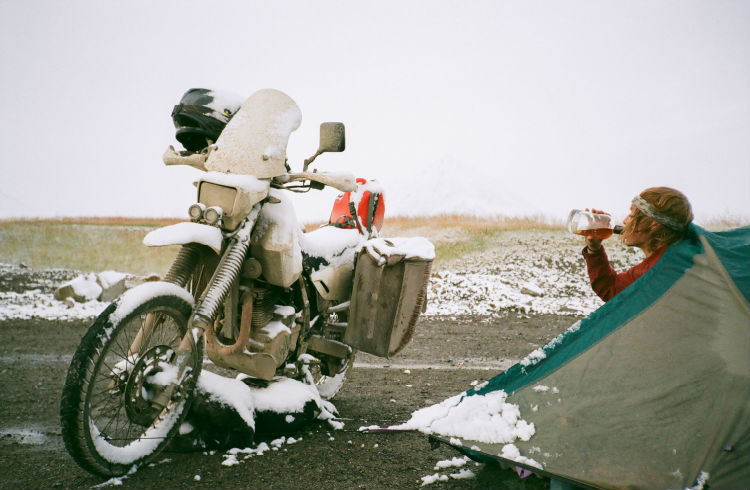 Photo © James Barkman
Photo © James Barkman
Listen Now
Alongside delivering our fortnightly World Nomads destination podcast, we can now share bonus episodes shining the spotlight on amazing people doing amazing things.
James Barkman dropped out of regular life to journey 4,500 miles, in his beloved 1976 VW Westfalia, before ditching four wheels for two and tackling the Pan American Trail from Alaska to Patagonia on a Suzuki DR650.
In This Episode
00:08 We are World Nomads
00:26 Introduce James Barkman
00:47 Hit the Road: Van’s Nomads and Roadside Adventures
01:27 Who is Melody?
02:37 Zen in the art of Volkswagon maintenance
05:35 Overcoming the cold while on the road
08:27 Making the leap
12:30 Swapping four wheels for two
15:00 What’s next for James
16:46 Don’t argue with an avalanche
19:54 Buy the DR650 – pick up Chile only
20:22 Win a copy of Hit the Road: Van’s Nomads and Roadside Adventures
21: Our next Amazing Nomad
Who Is On the Show
James Barkman is a documentary and editorial photographer. Born and raised on an ostrich farm in rural Pennsylvania, James is a ‘seeker and gatherer of genuine stories and experiences’. James has just finished riding his Suzuki '96 DR650 from Alaska to Patagonia after garaging his beloved ‘76 VW following a couple of years road
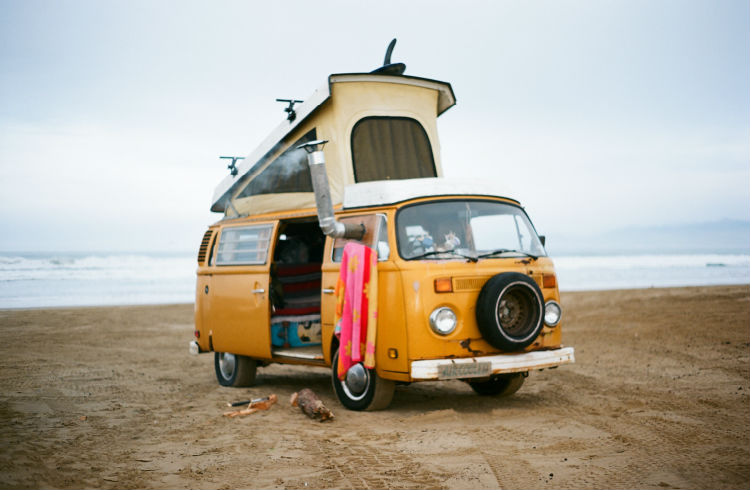
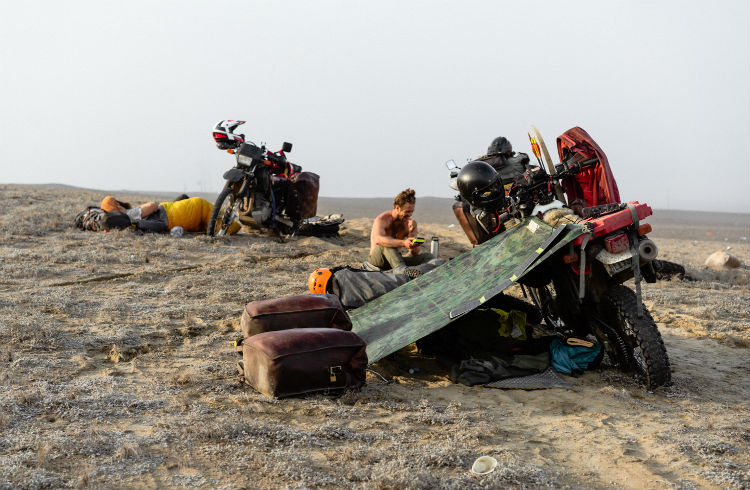
Win a copy of "Hit The Road"
"Hit the Road features the individuality of overland vehicles, their passionate owners, and the inspiring journeys that celebrate a life on the move.
There's a worldwide movement of people escaping the buzz of cities and diving into nature-packed camping trips and weekends away. Recharged, some head back on Sunday evening; others keep driving for months on end as they visit new countries, experience new cultures, and collect new memories.
Their rides range from the classic Volkswagen camper to cozy refurbished Airstream trailers and unstoppable fully-equipped 44 Adventure mobile. The journey continues with stunning photography from the deserts of Africa to snow-tipped mountains in Mongolia.
Experts share their experiences, their tips and tricks, and their favorite campfire-friendly recipes for life on four wheels. Are you ready to hit the road?"
To win subscribe, rate and comment on iTunes. The comment we like best will win a copy of the book thanks to Gestalten.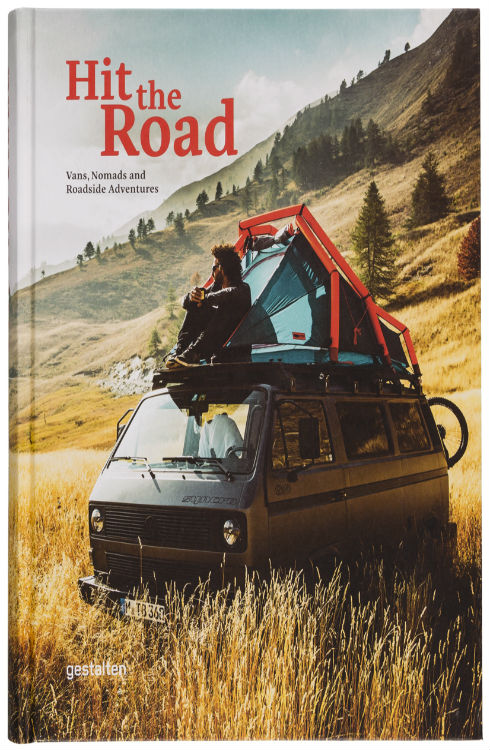
Buy, Swap & Sell
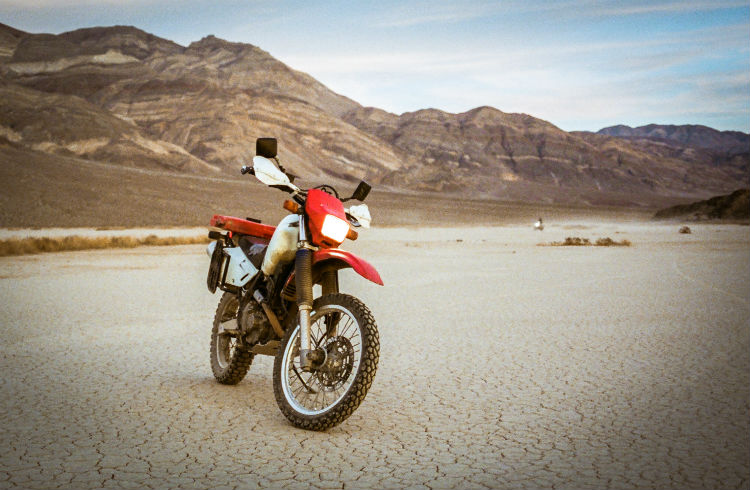
Want to buy James' DR650? DM him on Instagram @jamesbarkman
Scholarships Newsletter
Sign up for scholarships news and see what opportunities are live here.
Want To Republish This Episode?
Copy this code onto your web page or blog:<iframe width="100%" height="200" src="https://player.whooshkaa.com/player/episode/id/266574?visual=true&sharing=true" frameborder="0" style="width: 100%; height: 200px"></iframe>
Want to Talk to us?
We want to hear from you! If you have any travel insurance questions to Ask Phil, want to give us feedback on the episode, or have suggestions for topics you'd like us to cover, email us at podcast@worldnomads.com
Sign up for Podcast News
Explore your boundaries and discover your next adventure with The World Nomads Podcast. Hosted by Podcast Producer Kim Napier and World Nomads Phil Sylvester, each episode will take you around the world with insights into destinations from travelers and experts. They’ll share the latest in travel news, answer your travel questions and fill you in on what World Nomads is up to, including the latest scholarships and guides. The World Nomads Podcast is not your usual travel Podcast. It’s everything for the adventurous, independent traveler. Don’t miss out. Subscribe today.
Speaker 1: The World Nomads Podcast Bonus Episode. Hear amazing nomads sharing their knowledge, stories, and experience of world travel.
Speaker 2: Thank you for tuning in to this amazing nomads episode. It's the latest in our bonus series. It sits alongside our destination podcast and highlights those travelers who demonstrate discovery, connection, transformation, fear and/or love. I think I've learned those off by heart. They go through my head each time I hit the pillow at night.
Speaker 3: There you. Look, James Barkman is a documentary and editorial photographer. He says he's inspired by the mountains and the sea. Who isn't? He was born and raised on an ostrich farm in rural Pennsylvania. Wait a minute! An ostrich farm in Pennsylvania? I've got to say, he has a tendency to live on the grittier side of life, doesn't he?
Speaker 2: Yeah, he certainly does. At the moment he's living off his '96 Suzuki DR650 riding from Alaska to Patagonia. Now I was really interested in him after reading this book called "Hit the Road: Vans, Nomads, and Roadside Adventures" It's a beautiful hardback book but it's about travelers that love road tripping but kind of off the beaten track adventures as the names suggests. And it also has tips on how to trick your van out or whatever you're traveling in, food to cook while on the road and just looking it through it, it actually totally inspiring. It has me thinking.
Speaker 3: And James, you did it in an orange, beat-up, VW camper van.
James: In a '76 camper van, yup.
Speaker 3: Did you give it a name? Did you personify it?
James: I did actually.
Speaker 3: Yeah, go on.
James: Yeah, I named it Melody and that's just her first name and her last name is
Speaker 2: Beautiful. You found it on Craig's list but I've got a girlfriend who she's named Gidget and Gidget is always breaking down. What about Melody?
James: I would say the same for Melody for sure. When I actually bought her on Craig's list, she broke down on the way home. I had about a three and a half hour drive and at the time, I really knew nothing about vans. I wanted to learn, of course, but I had no experience and she broke down and let me sit for quite a few hours and I had no idea what to do but it was only right that she broke down right away because there have been countless others.
Speaker 3: Seriously, do you want to learn about motor vehicle maintenance, get a VW camper van.
Speaker 2: Yeah, and learn very quickly.
James: I call it learning the art of Volkswagon maintenance because, I mean, I'm sure we're all familiar with the books Learning the Art of Motorcycle Maintenance but it really teaches you so much more about the actual mechanics. It teaches you patience and just kind of ingenuity and all of that. So I'm grateful for that.
Speaker 3: And how to swear.
James: Absolutely. I've had quite a few frustrating times with it.
Speaker 3: All right, now can we just lead back a bit in the story about you and Melody. So you're living in Pennsylvania when you bought the camper van and you had this idea of going over to the West Coast of America. Just tell us about that. Where did that idea come from? Why were you motivated to do that?
James: I think it's kind of growing up in the states and in small rural area Pennsylvania, it's kind of the American dream to just go West and do a big road trip and I think as long as I Can remember I was like, "I'm going to grow up and I'm going to grab a whole bunch of buddies and buy an old rickety van or something and just drive West and see what happens.", and as I got older, I found the van, got interested in Volkswagon, got the van and all of a sudden, "Wait, I can actually do this and not just keep talking about it but I can hop in and drive West." So, that's more or less what I did and I think just growing up on the East Coast of the states, there is kind of this allure to the West Coast and it definitely attracted me. I kind of picked up and left off and had been living out there ever since for the most part.
Speaker 2: We've watched a video of you driving Melody and there are some pretty challenging weather conditions as well but I note in the book Phil, he's overcome those. James, you've got a potbelly stove inside Melody.
James: Yes, I do.
Speaker 2: Is that a little dangerous? I think it might smoke it out.
Speaker 3: No. No, no. He's also got... Tell us how you've adapted. You've got an exhaust as a smoker.
Speaker 2: Yeah, it looks like the smoke is going directly back into his van. Is that the case?
James: Yes it is. I actually don't know if it's legal. I never really found out. I've been stopped a couple of times by cops and they were kind of always surprised by it but I've never gotten in trouble so as far as legality goes, I guess I think it's legal but as practically speaking, I mean, it kind of just started as an idea when I moved into the van, it was just...
James: East Coast winters get really cold and I didn't want to deal with probing heat because it's a little dangerous with the poisoning and I didn't have electricity or anything like that so I was like, "Man, I'll just get a wood stove. That would work perfectly.", and it kind of just started from there. So I found a wood stove on Craig's list as well only fitting that I did and kind of just put it in and it's been in there ever since. It's kept me warm many a cold nights.
Speaker 3: Well, we're going to steal some pictures out of that book so people can see how the stove works and how you've got a proper exhaust system going on, I'm pretty sure. But listen, tell us a bit about... I know from watching the film that you had a regular job in a mechanical workshop and you decided that wasn't the life for you.
James: Yes, absolutely. I think it's important to have, in different seasons of life, to have stability and financial stability and things like that and at the time, I was working a job, I knew it was valuable and I wanted to save money and learn different skills and things like that but I knew that that wasn't really what I wanted to do. It was kind of more of a means to a next step and so I worked that job for a few years, quite a few years and then when I had saved a lot of money and kind of had more of an idea what I wanted to do when I quit, I kind of just put in my notice and quit and drove West.
Speaker 3: And what you wanted to do was photography and documentary making right?
James: Definitely. And I view myself as more of a creative than an artist and photography as more of the medium that I'm working with right now and I think that can kind of change throughout the journey of life but as of now, I'm definitely interested in photography and doing a lot of documentary work. Correct.
Speaker 2: I was pretty excited to hear that Chris Burkard is one of your mentors and I follow Chris on the Instagram and he's got millions of followers. How inspirational has he been to you with your photography and your documentary making?
James: Yeah, Chris has helped me out in so many ways. Not only is he a great mentor, but he's a great friend as well and I owe a lot of what I am and what I know to Chris and he's definitely kind of bent over
Speaker 3: You make it sound like that was kind of a planned step but in the film, in the documentary, you're quite adamant about people not planning too much and making the leap first as a philosophy.
James: Definitely. I think it's a very fine balance and I think everyone kind of pendulums to the one side or the other and I'm guilty of that a well but when I kind of came up with that whole philosophy, I think I was a little far on the other side but too much stability and too much with monotony and I was like, "Man, I want to be free. I want to live without regrets." But I also want to be responsible and not throw everything out the window so yeah, I really believe in spontaneity and kind of just not living in a box, per se. It's definitely an important philosophy of my life.
Speaker 3: Yeah, I love people, they're an inspiration to travel is exactly that. I don't want to be inside that box. They've got to do something different to explore.
Speaker 2: Yeah, and he's exploring right now which we'll get to in a minute but I want to just get back to that road trip. Just give us a few of the stories that you experienced along the way. We've talked about the weather, we've talked about Melody breaking down. What else did you encounter that you can share?
James: On that specific road trip, we actually got stuck a few times. In the Pacific Northwest, there's a lot of rain. You have a really nice summer season but for the most part, it's raining and sometimes snowing throughout the year and also, in the Pacific Northwest, there are a lot of forest roads which are kind of just trails that lead out into the woods and to the mountains and those are often super muddy so one night when we were camping, sometimes you don't really have a map and you're not really following the directions. You kind of just meander down trails. Sometimes it's a dead end or it's overgrown, hasn't been driven in years so this one night, we drove down a road and we got incredibly stuck. It probably took us three hours to get out and we didn't have any pulley systems or anything or wedges so we kind of just manhandled it out and that's like a big part actually of living on the road.
James: I think it's just kind of following that spontaneity. You don't really go to formal campsites. You don't really go to the campgrounds. You kind of just drive into the woods and see what happens and sometimes you get stuck. I've been stuck for almost a week at times before but that night we were able to get out.
Speaker 3: So what did you learn? A boy from rural Pennsylvania and now you're in the Pacific Northwest. What do you think you learned from that first trip [inaudible 00:11:10]?
James: I don't know. It was kind of like a maiden voyage for me. There was a lot of unknown. I wasn't really established as far as my career, what I wanted to do. I was just kind of just figuring things out. I was only 21 years old and I mean, the van broke down quite a few times in Utah and actually almost burned one night. There was an oil leak in the back and it was dripping onto the exhaust which got really hot and we actually got completely smoked out. We had to stop and couldn't see, couldn't breathe in the van. So things like that happening and just meeting people on the way, breaking down, meeting people that help you out, it was kind of just like, I don't know. It was kind of just addicting in a sense that the thrill of the unknown, it's like, "Man, is this van going to drive thirty-five hundred miles from the East to West Coast?" I was like, "I don't know."
James: But all that thrill and that sense of unknown were addicting and it was also just challenging like in a mental sense and I think it shaped a lot of who I am and what I do I think.
Speaker 2: Well, it's great to have you because in this book you talk about garaging Melody. It was last year actually and getting another '96 Suzuki DR650 and your plans to go from Alaska to Argentina and also climb every major peak along the way so we've caught you during that. Where are you and what have you done?
James: So I'm currently in Peru and just a few days ago, me and my buddy, I'm traveling with two other friends, we just left this town called Huaraz in Peru and it's essentially known as [inaudible 00:12:58] of the Andes and it's surrounded by these twenty thousand foot or six thousand meter mountains in every direction. So we were actually there for the last three months just climbing as much as we could and now we're back on the road heading into Bolivia and on our way to Patagonia so you did catch me about definitely over half way now but yes, it's been an adventure.
Speaker: Can I ask you, how you got past the Darien Gap if you're riding. I know a lot of people want to do that North to South thing but the Darien Gap, as the name suggests is a gap that is not only impossible but also dangerous to attempt. Did you catch a boat around it? What did you do?
James: Yeah, it's definitely probably the hardest thing logistically to do with a trip like this but essentially, we loaded our bikes into a shipping container and shipped it from Panama to Columbia and it's kind of a ghetto process. I mean, the paperwork is a little sketchy. You sometimes get stuck and you have to wait for three weeks while your boat is somewhere so that's more or less what we did and we caught a plane into Columbia and then waited for our bikes to get shipped in a container. So it would have been awesome to drive to Darien but
Speaker 3: No, I don't recommend it at all. Hey, but there are probably worse places to be stuck than in Columbia, right? That's supposed to be awesome.
James: Yeah, it is an awesome country but the time that we were stuck in Cartagena and it's really, really hot, like probably the hottest place I've ever been in so that wasn't exactly the most enjoyable time. But, it's not the worse place, like you said.
Speaker 2: Once you've reached Argentina, then what's next James?
James: I'm definitely thinking about it. There's a lot of opportunity and ideas. Practically speaking, I want to pursue more documentary works so I'm hoping to go back to Afghanistan post-trip on a project. I was there actually right before I left on this motorcycle trip and as I said, I'm a photographer as well so I'll be doing different projects but one of my greatest passions is climbing so I would hope to kind of maybe climb in the Alps or the Alaska range, the Himalayas, so I'm kind of figuring that all out so I'm kind of juggling my career with my passions and sometimes they blend together which is great but that's kind of tentative plan post-trip.
Speaker 3: Do you see this as this is your life now, forever, or do you think there may be a period where this is not really possible anymore?
James: I think about sustainability a lot and what I'm doing now, I don't want to just do it for a few years and then go work in a cubicle for the rest of my life. I want to climb the rest of my life, I want to shoot the rest of my life and I think in throughout different seasons, things can look very different. You know, whether you have a family, whether you have career commitments and whatnot but for the most part, those core values of just living with risks and without regrets and with spontaneity, I want to always keep those near and dear and hopefully I'll continue to do things like this the rest of my life.
James: I definitely don't think of it as a short season. Hopefully, it will be sustainable throughout my life.
Speaker 3: You can at least weave into the rest of your life as well. Speaking of risk, apart from climbing, electricity power poles-
Speaker 2: Which you've seen his videos.
Speaker 3: Which you see in the video, but how... Yeah, I know. I get the thrill, all right? But do you manage that risk as well? Do you sort of like go, "Maybe, maybe not this time?"
James: Absolutely. We actually just came back from a climb in the Andes and it was a nine-day expedition. We were kind of way out in the mountains and we were at the base camp of this climb that we wanted to do called Alpa [Miles 00:17:15]. A beautiful mountain. You should [inaudible 00:17:18]. It's wonderful and we were about to go for it and we noticed an avalanche had come down the route and it had just released the avalanche and two weeks prior to that, three climbers had actually lost their lives on that same route so as bad as we wanted to climb that mountain, we worked so hard to get there, just the logistics, the physical challenges to get there and then there's an avalanche so we actually waited. We're like, "Maybe we'll climb it tomorrow.", and then there's another avalanche and we actually ended up bailing because it just wasn't safe enough and although we could have probably climbed it and there wouldn't have been buried in it or something, it's just kind of a gamble and I want to take calculated risks and not foolish risks.
James: I want to not only climb but kind of do all kinds of at-risk or action sports, whatever you want to call them and if I'm not [inaudible 00:18:24] and wise then I probably won't be able to.
Speaker 3: Yeah, you can't really argue with an avalanche, can you?
James: It's not very forgiving.
Speaker 2: I'm sure your mum would be happy to hear that. That you're [crosstalk 00:18:35] Make sure you keep in touch with her and keep us in the loop on what you're up to.
Speaker 3: Yeah, if you're publishing your photographs as you go along, can the listeners follow you somewhere.
James: Yeah, I'm working with a number of brands and sponsors so there's kind of like stories that are getting published through these different platforms. I'm a little dormant on my personal website at the moment just because living off a motorcycle is pretty hard as you can imagine, finding electricity and power and service. It's actually pretty hard to find service just to hop on a call. But, post-trip I'm hoping to publish a book as well as publish the stories from this trip on my site and through the brands and companies that I'm working with. So as time goes on, I think there will be a lot of easier ways to kind of see stories and images from this trip as well as others.
Speaker 2: Awesome James. Thanks for that. Firstly an update as we said at the beginning of the podcast, he was about to embark from Alaska to Patagonia.
Speaker 3: Patagonia.
Speaker 2: Yup. He's actually finished that.
Speaker 3: That was quick.
Speaker 2: Took about eighteen minutes. This is the time of our recording. He's now selling though Phil, this is enough to shed a tear, his beloved 1996 Suzuki DR650 in Chile and he says if you're looking for a motor trip through the Americas than say no more.
Speaker 3: Buy, swap and sell on the road on our next podcast. There you go. Well, it's well running now. It'll probably earn its own way if you want to do that.
Speaker 2: True. We'll have a photo of it too.
Speaker 3: Okay, we'll put it up.
Speaker 2: Yeah, put it in the show next.
Speaker 3: There's never been a better opportunity to swing across to iTunes and subscribe to the World Nomad's Podcast because once you subscribe and rate and leave a comment, we're going to take the comment that we like the best and we're going to give away a copy of that book.
Speaker 2: Giveaways and buy, swap, and sell.
Speaker 3: Hit The Road: Vans, Nomads and Roadside Adventures. It's a beautiful book as well by the way.
Speaker 2: Yeah, as I said at the beginning of the podcast, it truly is inspiring and it's one of those, they call them coffee table books.
Speaker 3: Sure.
Speaker 2: But it's so much more than that. You really do, you pick it up and this is the adventure I want to do. The next time you pick it up, no actually I think this is the adventure that I want to do.
Speaker 3: And build my potbelly stove in my camper van.
Speaker 2: That's it.
Speaker 3: That's it.
Speaker 2: Next week our Amazing Nomad series continues with Mike Dawson, a kiwi kayaker who funded his own Olympic dream. Wait until you hear how. It's not just the competition courses that he tackles, his adventure side has Mike kayaking some of the wildest rivers in the world. He's our Amazing Nomad next week. See you then.
Speaker 3: Bye.
Speaker 1: Amazing Nomads. Be inspired.




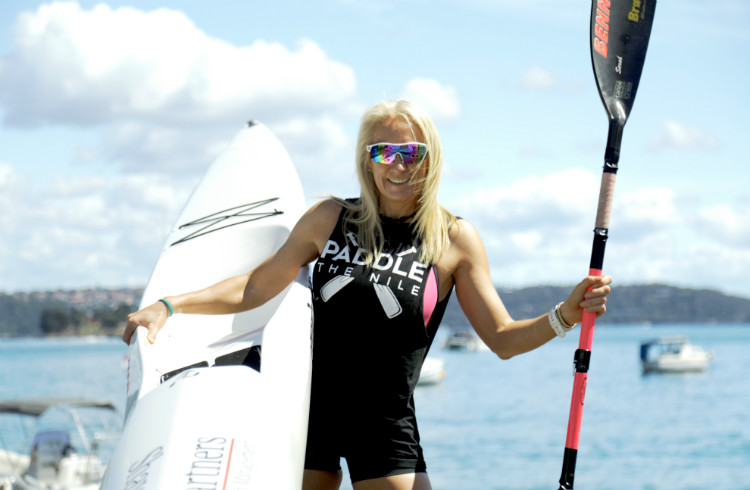
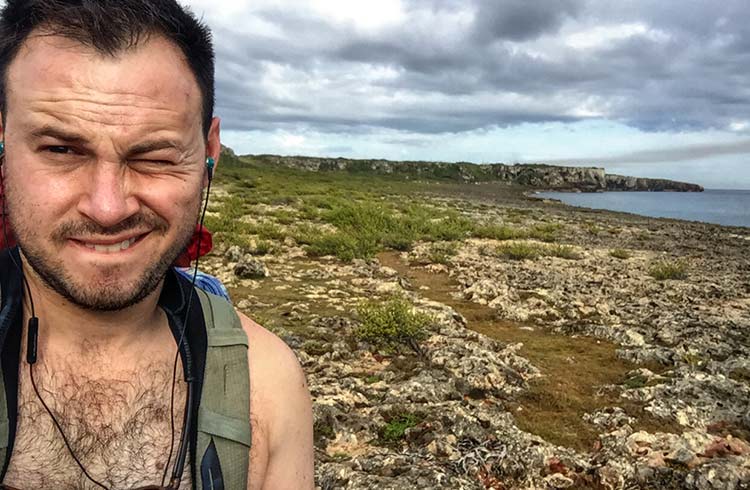
No Comments